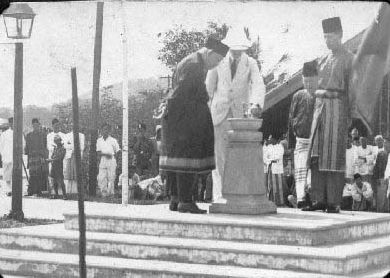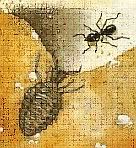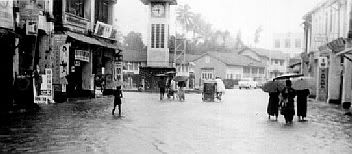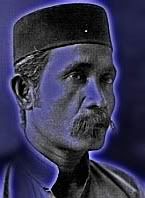View From The Wakah
We dreamt up things in our waking hours and went to sleep on a nyiur komeng. That about sums up life on the wakaf. My brother once told me of an old school friend he sent out on an errand when he was back in Kuala Trengganu, and the friend came back — he did — but well after dark, because, he said, he'd fallen asleep on the wakah (standardspeak wakaf fr. Arabic waqf) in Pantai Teluk.
The wakah as
 we say it, had a well worn floor from regular games of draughts, and a gentle breeze blew across its boards, interweaving between the four pillars that raised the roof above the head, senggora tiles terracota coloured, and rafters of chengal wood. Fishermen stopped there on their way home from work, beachcombers piled their day's collection at its foot. There was no alfresco music then, thank God, so the wakah was an ideal place for a chat as the world walked by, as the game of draughts continued apace, moving pieces shaped from the tops of bottles of air lamnid; what jollity went there by day, what mischiefs passed there by night.
we say it, had a well worn floor from regular games of draughts, and a gentle breeze blew across its boards, interweaving between the four pillars that raised the roof above the head, senggora tiles terracota coloured, and rafters of chengal wood. Fishermen stopped there on their way home from work, beachcombers piled their day's collection at its foot. There was no alfresco music then, thank God, so the wakah was an ideal place for a chat as the world walked by, as the game of draughts continued apace, moving pieces shaped from the tops of bottles of air lamnid; what jollity went there by day, what mischiefs passed there by night.The wakahs were the landmarks of Trengganu, put up by anonymous donors along public roads and in the middle of sawahs, on beaches and under big trees, and in the middle of nowhere even, always sheltering people from the rain and heat, always a place for them to rest their feet and rest their heavy heads on the nyiur komeng. The nyiur komeng was a dud coconut that had no flesh and had little weight, so a dip was carved into its dried outer husk wide enough to take the back of the head. And that was where my brother's old school-friend rested his head as dusk crept slowly over his feet until he was totally draped and lulled to sleep by the gentle sea breeze and the dark, while the items he was sent out to buy for the evening's kenduri sat forlornly by his ankles, still in their plastic bags.
There are places
 in Trengganu that are known by their wakahs, Wakah Ppelang (standardspeak, mempelam) and Wakah Tapir (standardspeak, tapai) to name but two without looking at a map, but there must be scores more in their wake. They marked the land, adorned a place, kept the weather out, rested the weary feet of travellers or sheltered them for the night. But the wakah by the roadside in a remote place was best avoided for you couldn't tell who'd be looking down at you from the rafters in the middle of a moonless night as light rain fell to earth.
in Trengganu that are known by their wakahs, Wakah Ppelang (standardspeak, mempelam) and Wakah Tapir (standardspeak, tapai) to name but two without looking at a map, but there must be scores more in their wake. They marked the land, adorned a place, kept the weather out, rested the weary feet of travellers or sheltered them for the night. But the wakah by the roadside in a remote place was best avoided for you couldn't tell who'd be looking down at you from the rafters in the middle of a moonless night as light rain fell to earth. Wakahs were landmarks in philanthropy for you could judge the disposition of a community by how its landscape were filled by the wakah. From the Tanjong in Kuala Trengganu where we lived I can still picture three wakahs in my head, but we were not really wakah kids so I can't tell you what transpired there among the wakah crowd besides the regular chorus of dang (standardspeak dam fr. 'dameh', the Egyptian name for this ancient game) terms that came to us as we passed by on our way to another place; and they were makang and bahang (both meaning 'capture') and the aji (the long-king) and darak (the ordinary game piece). Poor was a community without a wakah, and lonely a traveller that walked its place.
But wakah was more than just a stopping place, it was a vehicle for dreams and thought. A proper wakah with elaborate fretwork and wood carvings was first envisaged in the benefactor's head, then passed to the master woodworker by word of mouth. Then the latter gathered wood and craftsmen from the village to chisel and saw and nail or dowels as the patron saw fit, without benefit of any written notes, then as the last tile was laid on its roof, the workers would probably find cause to celebrate themselves by sitting there for a few days.
It is said that
 the haunting sound of the Trengganu Royal nobat ensemble came form noises heard from the sea, but I suspect that they were heard not from the Trengganu perahu besar that sailed along the coast to Singgora to buy the tiles, nor from the fishing payangs that daily left our golden shore, but by sharp-eared men sitting quietly watching the waves from the comfort of a sea-side wakah. Moooo the sea said, and he kept a mental note, waaaaah came another sound, and that went straight under his songkok, and then there were the wooos and the lilts and the mewling sound that could only be the wailing of our mermaids.
the haunting sound of the Trengganu Royal nobat ensemble came form noises heard from the sea, but I suspect that they were heard not from the Trengganu perahu besar that sailed along the coast to Singgora to buy the tiles, nor from the fishing payangs that daily left our golden shore, but by sharp-eared men sitting quietly watching the waves from the comfort of a sea-side wakah. Moooo the sea said, and he kept a mental note, waaaaah came another sound, and that went straight under his songkok, and then there were the wooos and the lilts and the mewling sound that could only be the wailing of our mermaids.It is difficult to sit on the wakah on a moonlit night with eyes firmly fixed on the landscape without also hearing a distant call that causes a local pain in the heart. In Trengganuspeak as in the standard lingo, this is the sayu of one's longing — for another time, another place — and the pain, the pilu is the tugging of a melancholy heart. This is the pain in the heart of standardspeak's menyayat hati, which is closer to 'nostalgia' as it originally meant* but not its latter meaning. And what is the longing and the pain all about? Well, it's a feeling that probably has primordial roots, an atavism that no longer knows what it's for. For times past that really went perhaps, or that were presumed to be. It is difficult to pin-point the extent of this sayu except by defining it as a distant call, as people are often attracted by a 'past' that may not have been real at all. Trengganuspeak has no word for this, but the Portuguese 'saudade' may sum it all, 'a longing for a whimsical present or past.'
*Nostalgia Note: The word 'nostalgia' was invented on 22nd June 1688 by Johannes Hofer, an Alsatian medical student, by combining nostos ('return') with algos in his medical thesis Dissertatio Medica de Nostalgia to describe the sickness of Swiss soldiers kept far away from their mountains. — Alberto Manguel, A Reading Diary.


 The Cik Ru has made many appearances in these blogs, often under the Sekolah Ladang where they were buried in sand. I mentioned once that we used to fish them out of their conical holes with a strand of hair. How we caught them was one thing, and what we did with them was another. And the answer is mostly, nothing at all. They were just fascinating creatures with a round body and pincered in one end. They had six legs which they put to good use, burrowing deep into their inverted cones. Once I was even rude about the Cik Ru, saying that they were of no use to anyone. I now regret that unwarranted solipsism, forgetting that there may well be Cik Ru bloggers who've indeed questioned the relevance of men, who are of no discernible use at all, and whose little ones sometimes appeared beneath the school-house wreaking havoc with their lives with strands of hair.
The Cik Ru has made many appearances in these blogs, often under the Sekolah Ladang where they were buried in sand. I mentioned once that we used to fish them out of their conical holes with a strand of hair. How we caught them was one thing, and what we did with them was another. And the answer is mostly, nothing at all. They were just fascinating creatures with a round body and pincered in one end. They had six legs which they put to good use, burrowing deep into their inverted cones. Once I was even rude about the Cik Ru, saying that they were of no use to anyone. I now regret that unwarranted solipsism, forgetting that there may well be Cik Ru bloggers who've indeed questioned the relevance of men, who are of no discernible use at all, and whose little ones sometimes appeared beneath the school-house wreaking havoc with their lives with strands of hair. Cik Ru mentions:
Cik Ru mentions:

